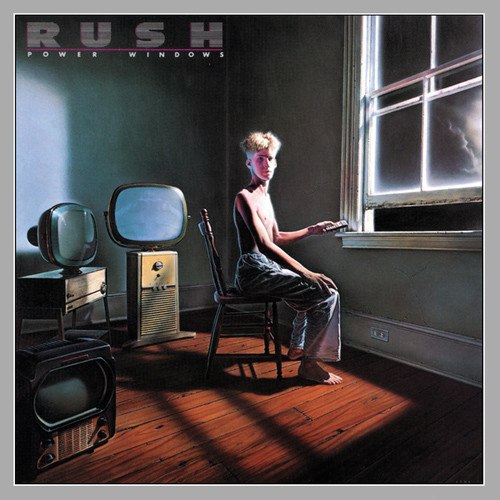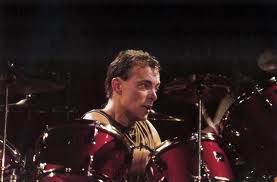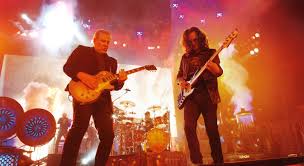It’s the power and the glory
It’s a war in paradise
It’s a cinderella story
On the tumble of the dice
—Neil Peart, “The Big Money,” 1985
***

Power Money
It would have been impossible to avoid Power Windows in the Fall of 1985, I being a senior in a Kansas high school, even if I had wanted to.
And, I didn’t.
Every where I turned that fall—in ways far more than any other Rush song since Tom Sawyer—I heard “The Big Money.” MTV played the video repeatedly (we didn’t have MTV, but friends did), and our wonderful local radio station—KICT95 out of Wichita—had it in constant rotation. Of course, being a massively obsessed Rush fan since first encountering them in 7th grade detention, I was thrilled to see Rush get so much attention.
Sadly, though, I became overly saturated with “The Big Money.” It’s the only Rush song that has ever grown tiring for me. For years, it stood up there with “Stairway to Heaven.” I just shut both out of my mind, flipped the radio dial when either played. As Power Windows is one of my all-time favorite albums, this has been rather difficult for me to accomplish. For nearly two decades, though, I merely started the album with the second track, “Grand Designs.”
Then, on September 18, 2012, at the Palace in Auburn Hills, Michigan, standing next to my good friend, Dom, Rush played it as the second track of the Clockwork Angels tour. Straight from Subdivisions to The Big Money to Force Ten and then, three songs from Power Windows in a row: Grand Designs; Middletown Dreams; and Territories. Half of the album! Freaking brilliant. Poor Dom. He’s only a college student, and he had to hear my sound byte reminiscences for every track. I was reliving a huge part of my high school experience.
Seeing “The Big Money” live made me realize why that song is so wonderful. Alex, Geddy, and Neil brought immense energy to it (and Force Ten, as well—the most rocking version I’d heard from Rush; Alex even played one of his best guitar solos for this song on this tour). Suddenly, whatever tiredness and reluctance I’d felt about “The Big Money” over the last several decades dissipated at the moment the opening few notes began. Add video of spinning and printing dollars as well as the Three Stooges, and I was sold. (Sorry, bad choice of words). But, really, everything was perfect—the drumming, the bass, the guitar solo. And, of course, the Austin Powers moment at the end: “One million dollars!”
Now, as of the end of 2013, I’m back in and with those autumn days of 1985. Let “The Big Money” reign. I’ve also re-discovered my love of Led Zeppelin 4.
But, the point of the post is not to praise “The Big Money” specifically, but to remember Power Windows. I’m happy to praise both! And, frankly, I’ve been offering praise of Power Windows since it came out, but only with the caveat that The Big Money is a weak point. Now, in 2013, I realize how wrong I was. The whole thing deserves praise, and one cannot separate any song from the whole. It is what it is, and it’s a thing of immense beauty.

Power Jazz
In Contents Under Pressure (by Martin Popoff), Neil argues that he sees Power Windows and Hold Your Fire as two sides of the same coin, separate from Grace Under Press, but also from Presto. Certainly, there’s an argument to be made here. In terms of bass and drums, Power Windows and Hold Your Fire, have the most distinctly jazz feel of any Rush albums. At times, taking the rhythm section alone, the listener might be enjoying a Chick Corea album from the same time period. In production, though, Power Windows comes across as rather raw power, while Hold Your Fire feels rather lush. Whatever similarities—and they are many—the albums seem very different to the listener. Again, as Neil states, the first is an extrovert, while the second an introvert.
As a fan, though, I tend to hear consistent themes in Moving Pictures through Hold Your Fire. Moving Pictures stresses the need to be an individual against the crowd; Signals warns that being such an individual will cause pain, but is worth it; Grace Under Press deals with recovery from such persecution (sometimes in the hallway, sometimes in the concentration camp); Power Windows deals with excellence against conformity; and Hold Your Fire pleads for restraint in the now comfortable individual looking at those he’s made uncomfortable.
Granted, these themes are, for me, autobiographical, in the sense that I grew up with them, and each album plays a key role in my own understanding of the world. That is, these themes might not have been intended by Peart, and, admittedly, perhaps I’m alone in seeing them this way. As I’ve mentioned before, Neil Peart has influenced me as much as anyone in my life—ranging from Plato (I teach western civ for a living, so allow me a little pretense here) to St. Paul to my mother. Plato-Paul-Peart!!! The three Ps.
For me:
- Moving Pictures: 7th Grade
- Signals: 9th Grade
- Grace Under Pressure: 11th (Junior) Grade
- Power Windows: 12th (Senior) Grade
- Hold Your Fire: sophomore year of college.
 Power Themes
Power Themes
In terms of wordplay and poetry, Neil is at his best on Power Windows.
In The Big Money, Peart considers the good and the evils of what we now refer quite commonly as “Crony Captialism.” As with much of this album, the shadow of cultural critic, socialist-turned-libertarian and anti-war novelist, John Dos Passos, hangs over The Big Money. Dos Passos also called his style “The Camera Eye.” 1936’s The Big Money concluded Dos Passos’s famous U.S.A. Trilogy. Much like Peart, Dos Passos traveled incessantly, offering a fine cultural criticism over everything he surveyed.
Grand Designs, track two, comes from the final part of the “District of Columbia,” trilogy published by Dos Passos in 1949. It examines individual genius in line with nature and against nature. In the conflict of style and substance, Peart is also referencing the grand Anglo-American poet, T.S. Eliot, and his 1925 poem, The Hollow Men.
The third track, Manhattan Project, anticipates the history-telling prog of Big Big Train, offering a rather neutral analysis of the development of the first three atomic bombs. Interestingly enough for Peart, he continues to harken back to religious language and themes, specially Catholic, referring again and again to “a world without end.”
Marathon echoes a number of other Peart songs, but it does it with extraordinary energy. A celebration of the battle of the Athenians over the Persians in the Fifth Century, BC, it also, of course, deals with the virtue of fortitude.
Territories offers a scathing criticism of propaganda, nationalisms, and nation states. In his criticisms and in the clever examples, Peart echoes the anti-statism of Mark Twain.
Taken, most likely, from the famous 1925 sociological report of Muncie, Indiana, entitled Middletown. Not surprisingly, given the state of sociology in the 1920s, the report considers the every day habits and desires of rural Americans. In his own Middletown, Peart examines the life of rural America as well as the dreams of those wishing to escape, generally unfulfilled.
Emotion Decter is one of Peart’s most Stoic songs, offering something against both the extremes of optimism and the cynicism of despair. In the end, in a common Peart theme, man must restrain his reaction toward others, recognizing that one does not need approval of another should integrity already exist in the original act. A true man judges himself.
The final and most proggish/artistic song of the album is Mystic Rhythms. Rush ends with wonder at the intense diversity of the world and of all of the universe.

Power New Wave
Finding a producer for Power Windows proved difficult at first. After replacing the long-lived Terry Brown (every album up through Signals) with Peter Henderson (Grace Under Pressure), Rush found their third producer in Peter Collins, best known for his work with Nik Kershaw and Blancmange. Making the connection to Britain even stronger, Rush recorded much of the album at Abbey Road Studios and in parts of London. They also worked with Anne Dudley of the Art of Noise, who directed the strings.
Though Power Windows rocks with full force throughout almost all of the album (the final track, Mystic Rhythms, being the very proggy standout), it has also a strange New Wave feel to it. Ok, this needs explaining. Neil and Geddy sound as though they’re playing in a rocking jazz band from the 1980s, but Alex sounds as though he could be playing for The Fixx. Alex, like Jamie West-Oram, seems to be creating immense but punctuated guitarscapes. One of the things that makes Power Windows so effective, is this strange but powerful synthesis of jazz bass and drums with New Wave guitar. In ways that Drama (some of the same production crew worked on both) attempted to be for Yes in 1980, Power Windows succeeds at bridging prog, rock, New Wave, and jazz. I think Drama is a fine album (in fact, a favorite), but I think that Power Windows is truly successful at this attempt to bridge genres. Perhaps, of course, Power Windows couldn’t have come about without Drama first—but an exploration of this would be well beyond the intent of this post.
Suffice it say, I love both.

Power Sources:
- Martin Popoff, Contents Under Pressure (2004).
- Jerry Ewing, ed., Prog #35, Special Edition (April 2013).
- Neil Peart, Roadshow (2006).
- Power Windows liner notes (1985).
- Jim Berti and Durrell Bowman, Rush and Philosophy (2011). This book includes an essay by the brilliant economist (and philosopher), Steve Horwitz.










